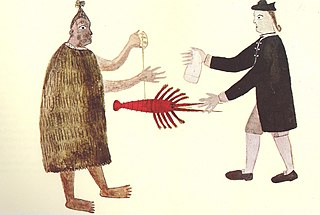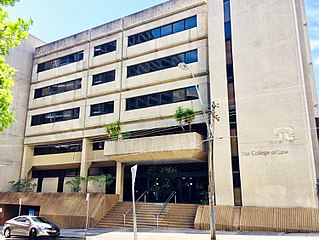External links
| This article related to Australian law is a stub. You can help Wikipedia by expanding it. |
The Australian and New Zealand Law and History Society was founded in 1993 and is a learned society for legal historians. Its membership is based primarily in Australia and New Zealand, and includes professional and academic historians as well as lawyers. Its main function is to organise an annual legal history conference, and it also publishes occasional journals, most recently the Australian and New Zealand Law and History Society e-Journal.
| This article related to Australian law is a stub. You can help Wikipedia by expanding it. |
Canon law is a set of ordinances and regulations made by ecclesiastical authority, for the government of a Christian organization or church and its members. It is the internal ecclesiastical law, or operational policy, governing the Catholic Church, the Eastern Orthodox and Oriental Orthodox churches, and the individual national churches within the Anglican Communion. The way that such church law is legislated, interpreted and at times adjudicated varies widely among these three bodies of churches. In all three traditions, a canon was originally a rule adopted by a church council; these canons formed the foundation of canon law.

The history of New Zealand dates back approximately 700 years to when it was discovered and settled by Polynesians, who developed a distinct Māori culture. Like other Pacific cultures, Māori society was centred on kinship links and connection with the land but, unlike them, it was adapted to a cool, temperate environment rather than a warm, tropical one.

Legal education is the education of individuals in the principles, practices, and theory of law. It may be undertaken for several reasons, including to provide the knowledge and skills necessary for admission to legal practice in a particular jurisdiction, to provide a greater breadth of knowledge to those working in other professions such as politics or business, to provide current lawyers with advanced training or greater specialisation, or to update lawyers on recent developments in the law.
A law society is an association of lawyers with a regulatory role that includes the right to supervise the training, qualifications, and conduct of lawyers. Where there is a distinction between barristers and solicitors, solicitors are regulated by the law societies and barristers by a separate bar council.
The call to the bar is a legal term of art in most common law jurisdictions where persons must be qualified to be allowed to argue in court on behalf of another party and are then said to have been "called to the bar" or to have received a "call to the bar". "The bar" is now used as a collective noun for barristers, but literally referred to the wooden barrier in old courtrooms, which separated the often crowded public area at the rear from the space near the judges reserved for those having business with the Court. Barristers would sit or stand immediately behind it, facing the judge, and could use it as a table for their briefs.
Terra nullius is a Latin expression meaning "nobody's land". It was a principle sometimes used in international law to justify claims that territory may be acquired by a state's occupation of it. It denotes land that has never been a part of a sovereign nation-state, such as Bir Tawil. International law adopts much of Roman property law in regard to acquisition of sovereignty due to the underlying European civil law at the time of early discovery voyages such as Christopher Columbus. The Roman law concepts acquisition of ownership of vacant territory or terra nullius therefore continues to apply in the modern age. This concept was often applied historically to land already possessed by indigenous populations and is subject to ongoing academic and political debate.

The Dominion of New Zealand was the historical successor to the Colony of New Zealand. It was a constitutional monarchy with a high level of self-government within the British Empire.

The Faculty of Law, Cambridge is the law school of the University of Cambridge. The faculty is one of the world's oldest and finest law schools, renowned for the quality of its teaching and its cutting-edge legal research, particularly in international law. It is regularly ranked as the best law school in the United Kingdom by major national league tables. In 2018, it was ranked the best law school in the United Kingdom and second best law school in the world.

The Society of Architectural Historians (SAH) is an international not-for-profit organization that promotes the study and preservation of the built environment worldwide. Based in Chicago in the United States, the Society’s 3,500 members include architectural historians, architects, landscape architects, preservationists, students, professionals in allied fields and the interested public.
Animal law is a combination of statutory and case law in which the nature – legal, social or biological – of nonhuman animals is an important factor. Animal law encompasses companion animals, wildlife, animals used in entertainment and animals raised for food and research. The emerging field of animal law is often analogized to the environmental law movement because "animal law faces many of the same legal and strategic challenges that environmental law faced in seeking to establish a more secure foothold in the United States and abroad".
SAHANZ was founded in South Australia in 1984. It is a scholarly society for the advancement of research into the history of architecture, with a focus on New Zealand, Australia and the South Pacific. It holds an annual conference and produces a journal, Fabrications. The current President is Paul Hogben, from UNSW.
Paul McHugh is a New Zealand academic lawyer. He teaches at the University of Cambridge where he is a Professor in Law and Legal History and Fellow of Sidney Sussex College.
New Zealand Truth was a tabloid newspaper published weekly in New Zealand from 1905 to 2013.
Wilfrid Prest is a historian, specialising in legal history, who is professor emeritus at the University of Adelaide. He is also a Fellow of the Royal Historical Society, the Australian Academy of the Humanities, the Academy of the Social Sciences in Australia, and Queen's College, University of Melbourne, and a member of the Council of the Selden Society, London.
The Law Society of New South Wales is a professional association which represents over 29,000 solicitors in Australia. The Law Society has statutory powers and regulates the practice of law in New South Wales.

The American Journal of Legal History is a peer reviewed, peer edited legal periodical. It has appeared quarterly since 1957. It was the first English-language periodical devoted solely to legal history. Since 2016 it has been published by Oxford University Press.

The College of Law is a postgraduate school for the study of law operating in Australia, New Zealand and Malaysia.

Jacinta Arianna Ruru is a New Zealand academic and the first Māori Professor of Law. She is of Raukawa, Ngāti Ranginui and Ngāti Maniapoto descent. Ruru is currently a professor at the University of Otago.